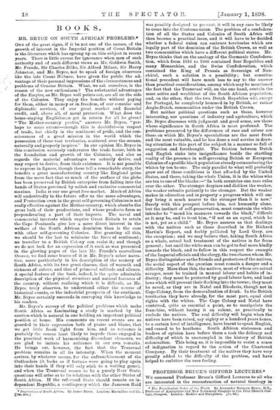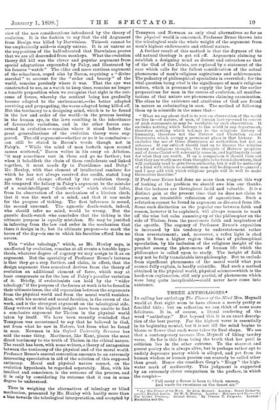PROFESSOR BRUCE'S GIFFORD LECTURES.* WE commend Professor Bruce's Gifford Lectures
to all who are interested in the reconstruction of natural theology in
• The Providential Order of the World. By Alexander Balmain Brace, an., Profe.sor of Apologetics and New Testament Exegesis in the Free Church 001. loge, Glasgow. London: Hodder and Stoughton. [is. 6da
view of the new considerations introduced by the theory of evolution. It is the fashion to say that the old Argument from Design was killed by Darwinism. This—it cannot be too emphatically said—is simply untrue. It is as untrue as the supposition of the half-educated that Darwinism proves that we are all descended from monkeys. What the evolution theory did kill was the clever and popular argument from special adaptations expounded by Paley, and illustrated by his famous "watch." The older and more cautious argument of the schoolmen, urged also by Bacon, requiring a "divine marshal" to account for the "order and beauty" of the world, remains precisely where it was. That the eye was constructed to see, as a watch to keep time, remains no longer a tenable proposition when we recognise that sight is the out- come of forces, whereby the sentient being has gradually become adapted to the environment,—the better adapted surviving and propagating, the worse adapted being killed off. But the testimony to a designing mind, which is to be found in the law and order of the world—in the process issuing in the human eye, in the laws resulting in the inheritance of favourable variations, and in the other forces con- cerned in evolution — remains where it stood before the great generalisations of the evolution theory were sug- gested. The old argument—whether or no it be conclusive— can still be stated in Bacon's words though not in Paley's. "While the mind of man looketh upon second =uses scattered," Bacon writes in his essay on Atheism, "it may sometimes rest in them and go no farther; but when it beholdeth the chain of them confederate and linked together, it must needs fly to Providence and Deity." Mr. Huxley, with that element of intellectual candour for which he has not always received due credit, stated long ago the real change effected by the evolution theory. He compared the fallacy in Paley's argument to the mistake of a semi-intelligent " death-watch " which should infer, from its observation of the mechanism of a kitchen clock, that it was the work of a mind, and that it was made for the purpose of ticking. The first inference is sound, the second unsound. The agnostic death-watch, indeed, who should infer no mind, would be wrong. But the gnostic death-watch who concludes that the ticking is the ultimate purpose is equally mistaken. He may be justified in inferring from the law and order in the mechanism that there is design in it; but its ultimate purpose—to mark the hours of the day—is one to which his faculties afford him no access.
This "wider teleology," which, as Mr. Huxley says, is unaffected by evolution, remains at all events a tenable hypo- thesis, whatever degree of cogency we may assign to it as an argument. But the speciality of Professor Bruce's lectures is that they go a step further, and claim, in effect, that the design argument thus conceived derives from the theory of evolution an additional element of force, which may at least compensate us for the loss of Paley's peculiar variation of it. Briefly, if evolutionists can hold by the "wider teleology," if the purpose of the forces at work is to be found in their ultimate issue, the old separation between the arguments from the physical world and from the moral world vanishes. Man, with his mental and moral faculties, is the crown of the -work, and is the strongest argument on the teleological side. Many writers of the highest insight have been unable to find a conclusive argument for Theism in the physical world taken by itself. We have been recently reminded that Tennyson was accustomed to say that he believed in God, not from what he saw in Nature, but from what he found in man. Newman in his Oxford University Sermons has said the same thing. Martineau, like Kant, places the most direct testimony to the truth of Theism in the ethical nature. The result has been, with some writers, a theory of antagonism between the testimony of the physical and of the moral world. Professor Bruce's central contention amounts to an extremely interesting speculation in aid of the solution of this supposed antinomy. Moral and physical nature cannot, on the evolution hypothesis, be regarded separately. Man, with his intellect and conscience, is the outcome of the process, and it is only by considering its outcome that it can in some degree be understood.
Thus in weighing the alternatives of teleology or blind mechanism, presented by Mr. Huxley with hardly more than a bias towards the teleological interpretation, and accepted by Tennyson and Newman as only rival alternatives so far as the physical world is concerned, Professor Bruce throws into the teleological scale the whole weight of the argument from man's highest endowments and ethical nature.
A further result of this method is that the dryness of the old natural theology is got rid off. Arguments claiming to establish a designing mind as distant and colourless as that of the God of the Deists, are replaced by a statement of the case which calls for the fullest consideration of the actual phenomena of man's religions aspirations and achievements.
The pedantry of philosophical specialists is overruled ; for the vital question being what is the significance of man's religions nature, which is presumed to supply the key to the earlier preparations for man in the course of evolution, all manifes- tations of that nature are phenomena claiming examination. The clues to the existence and attributes of God are found in nature as culminating in man. The method of following them up is scientific in the sense that-
" What we say about God is to rest on observation of the world we live in—of nature, of man, of human history—and to consist of such statements as may be verifiable by such observation. It excludes nothing which belongs to the world in any department, therefore nothing which belongs to the religious history of humanity, therefore not the Hebrew and Christian sacred literatures which occupy a prominent place in that history. It excludes the use of these literatures as authorities, but not as witnesses. If our subject should lead us to discuss the relative history of religious thought, the thoughts of Hebrew prophets and of Jesus Christ will relevantly come in. and legitimately count for what they are worth. If on a comparison it should turn out that they are worth more than thoughts to be found elsewhere, that will certainly tend to give them authority, but it will be authority of a kind with which no scientific man will be disposed to quarrel ; and I may add with which religious people will do well to make themselves familiar."
If Professor Bruce had done no more than suggest this way of looking at the problem we should owe him our thanks. But the lectures are throughout lucid and valuable. It is a distinct gain at the present time that he does not claim to present an irresistible refutation of agnosticism. Such a refutation cannot be found in argument as divorced from life. Some such distinction as the popular one between faith and reason, however it be explained, will always remain to mark off the wise but calm summing-up of the philosopher on the side of Theism, from the passionate faith and inspiration of the apostle. The cogency of Professor Bruce's exposition is increased by his tendency to understatement rather than overstatement; and, moreover, a reflex light is shed upon it from a higher region than that of philosophical speculation, by his inclusion of the religious insight of the prophet among the phenomena of human life which the philosopher is called upon to study. The insight of faith may not be fully translatable into philosophy. But to exclude from significant phenomena of the moral world what you cannot fully explain, is hardly scientific. Had such a method obtained in the physical world, physical science—which is the hard-won explanation, still only partial, of phenomena which
were long quite inexplicable—could never have come into existence.











































 Previous page
Previous page